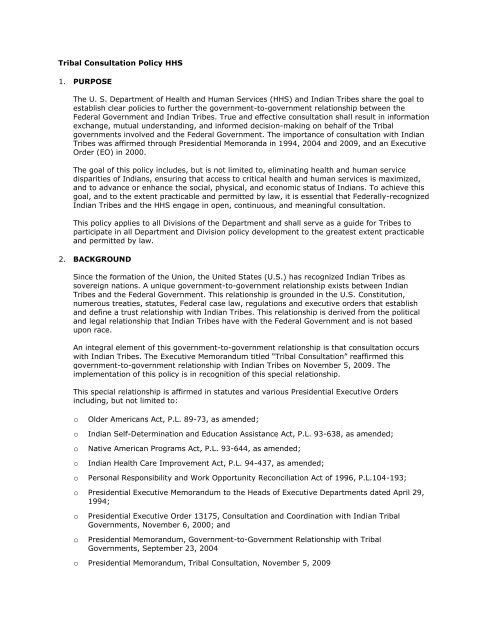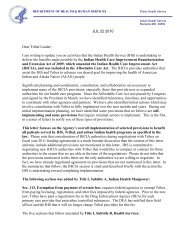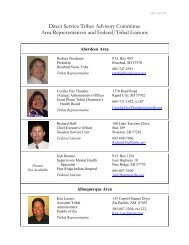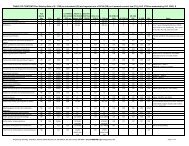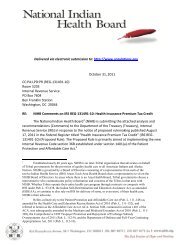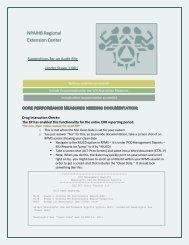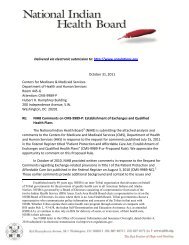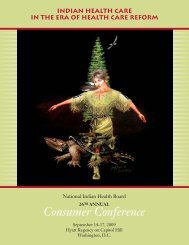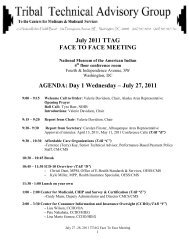mmpc - National Indian Health Board
mmpc - National Indian Health Board
mmpc - National Indian Health Board
You also want an ePaper? Increase the reach of your titles
YUMPU automatically turns print PDFs into web optimized ePapers that Google loves.
Tribal Consultation Policy HHS<br />
1. PURPOSE<br />
The U. S. Department of <strong>Health</strong> and Human Services (HHS) and <strong>Indian</strong> Tribes share the goal to<br />
establish clear policies to further the government-to-government relationship between the<br />
Federal Government and <strong>Indian</strong> Tribes. True and effective consultation shall result in information<br />
exchange, mutual understanding, and informed decision-making on behalf of the Tribal<br />
governments involved and the Federal Government. The importance of consultation with <strong>Indian</strong><br />
Tribes was affirmed through Presidential Memoranda in 1994, 2004 and 2009, and an Executive<br />
Order (EO) in 2000.<br />
The goal of this policy includes, but is not limited to, eliminating health and human service<br />
disparities of <strong>Indian</strong>s, ensuring that access to critical health and human services is maximized,<br />
and to advance or enhance the social, physical, and economic status of <strong>Indian</strong>s. To achieve this<br />
goal, and to the extent practicable and permitted by law, it is essential that Federally-recognized<br />
<strong>Indian</strong> Tribes and the HHS engage in open, continuous, and meaningful consultation.<br />
This policy applies to all Divisions of the Department and shall serve as a guide for Tribes to<br />
participate in all Department and Division policy development to the greatest extent practicable<br />
and permitted by law.<br />
2. BACKGROUND<br />
Since the formation of the Union, the United States (U.S.) has recognized <strong>Indian</strong> Tribes as<br />
sovereign nations. A unique government-to-government relationship exists between <strong>Indian</strong><br />
Tribes and the Federal Government. This relationship is grounded in the U.S. Constitution,<br />
numerous treaties, statutes, Federal case law, regulations and executive orders that establish<br />
and define a trust relationship with <strong>Indian</strong> Tribes. This relationship is derived from the political<br />
and legal relationship that <strong>Indian</strong> Tribes have with the Federal Government and is not based<br />
upon race.<br />
An integral element of this government-to-government relationship is that consultation occurs<br />
with <strong>Indian</strong> Tribes. The Executive Memorandum titled “Tribal Consultation” reaffirmed this<br />
government-to-government relationship with <strong>Indian</strong> Tribes on November 5, 2009. The<br />
implementation of this policy is in recognition of this special relationship.<br />
This special relationship is affirmed in statutes and various Presidential Executive Orders<br />
including, but not limited to:<br />
o Older Americans Act, P.L. 89-73, as amended;<br />
o <strong>Indian</strong> Self-Determination and Education Assistance Act, P.L. 93-638, as amended;<br />
o Native American Programs Act, P.L. 93-644, as amended;<br />
o <strong>Indian</strong> <strong>Health</strong> Care Improvement Act, P.L. 94-437, as amended;<br />
o Personal Responsibility and Work Opportunity Reconciliation Act of 1996, P.L.104-193;<br />
o Presidential Executive Memorandum to the Heads of Executive Departments dated April 29,<br />
1994;<br />
o Presidential Executive Order 13175, Consultation and Coordination with <strong>Indian</strong> Tribal<br />
Governments, November 6, 2000; and<br />
o Presidential Memorandum, Government-to-Government Relationship with Tribal<br />
Governments, September 23, 2004<br />
o Presidential Memorandum, Tribal Consultation, November 5, 2009


